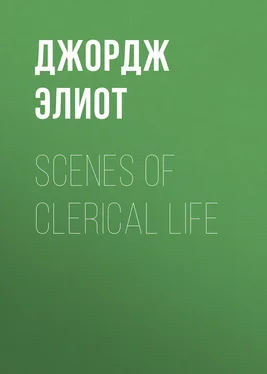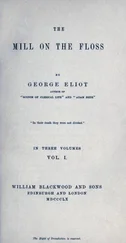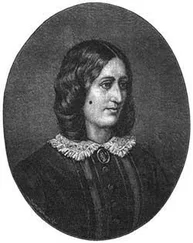Джордж Элиот - Scenes of Clerical Life
Здесь есть возможность читать онлайн «Джордж Элиот - Scenes of Clerical Life» — ознакомительный отрывок электронной книги совершенно бесплатно, а после прочтения отрывка купить полную версию. В некоторых случаях можно слушать аудио, скачать через торрент в формате fb2 и присутствует краткое содержание. Жанр: foreign_antique, Религиозная литература, foreign_religion, на английском языке. Описание произведения, (предисловие) а так же отзывы посетителей доступны на портале библиотеки ЛибКат.
- Название:Scenes of Clerical Life
- Автор:
- Жанр:
- Год:неизвестен
- ISBN:нет данных
- Рейтинг книги:5 / 5. Голосов: 1
-
Избранное:Добавить в избранное
- Отзывы:
-
Ваша оценка:
- 100
- 1
- 2
- 3
- 4
- 5
Scenes of Clerical Life: краткое содержание, описание и аннотация
Предлагаем к чтению аннотацию, описание, краткое содержание или предисловие (зависит от того, что написал сам автор книги «Scenes of Clerical Life»). Если вы не нашли необходимую информацию о книге — напишите в комментариях, мы постараемся отыскать её.
Scenes of Clerical Life — читать онлайн ознакомительный отрывок
Ниже представлен текст книги, разбитый по страницам. Система сохранения места последней прочитанной страницы, позволяет с удобством читать онлайн бесплатно книгу «Scenes of Clerical Life», без необходимости каждый раз заново искать на чём Вы остановились. Поставьте закладку, и сможете в любой момент перейти на страницу, на которой закончили чтение.
Интервал:
Закладка:
The sad good-byes had all been said before that last evening; and after all the packing was done and all the arrangements were made, Amos felt the oppression of that blank interval in which one has nothing left to think of but the dreary future—the separation from the loved and familiar, and the chilling entrance on the new and strange. In every parting there is an image of death.
Soon after ten o'clock, when he had sent Nanny to bed, that she might have a good night's rest before the fatigues of the morrow, he stole softly out to pay a last visit to Milly's grave. It was a moonless night, but the sky was thick with stars, and their light was enough to show that the grass had grown long on the grave, and that there was a tombstone telling in bright letters, on a dark ground, that beneath were deposited the remains of Amelia, the beloved wife of Amos Barton, who died in the thirty-fifth year of her age, leaving a husband and six children to lament her loss. The final words of the inscription were, 'Thy will be done.'
The husband was now advancing towards the dear mound from which he was so soon to be parted, perhaps for ever. He stood a few minutes reading over and over again the words on the tombstone, as if to assure himself that all the happy and unhappy past was a reality. For love is frightened at the intervals of insensibility and callousness that encroach by little and little on the dominion of grief, and it makes efforts to recall the keenness of the first anguish.
Gradually, as his eye dwelt on the words, 'Amelia, the beloved wife,' the waves of feeling swelled within his soul, and he threw himself on the grave, clasping it with his arms, and kissing the cold turf.
'Milly, Milly, dost thou hear me? I didn't love thee enough—I wasn't tender enough to thee—but I think of it all now.'
The sobs came and choked his utterance, and the warm tears fell.
CONCLUSION
Only once again in his life has Amos Barton visited Milly's grave. It was in the calm and softened light of an autumnal afternoon, and he was not alone. He held on his arm a young woman, with a sweet, grave face, which strongly recalled the expression of Mrs. Barton's, but was less lovely in form and colour. She was about thirty, but there were some premature lines round her mouth and eyes, which told of early anxiety.
Amos himself was much changed. His thin circlet of hair was nearly white, and his walk was no longer firm and upright. But his glance was calm, and even cheerful, and his neat linen told of a woman's care. Milly did not take all her love from the earth when she died. She had left some of it in Patty's heart.
All the other children were now grown up, and had gone their several ways. Dickey, you will be glad to hear, had shown remarkable talents as an engineer. His cheeks are still ruddy, in spite of mixed mathematics, and his eyes are still large and blue; but in other respects his person would present no marks of identification for his friend Mrs. Hackit, if she were to see him; especially now that her eyes must be grown very dim, with the wear of more than twenty additional years. He is nearly six feet high, and has a proportionately broad chest; he wears spectacles, and rubs his large white hands through a mass of shaggy brown hair. But I am sure you have no doubt that Mr. Richard Barton is a thoroughly good fellow, as well as a man of talent, and you will be glad any day to shake hands with him, for his own sake as well as his mother's.
Patty alone remains by her father's side, and makes the evening sunshine of his life.
MR. GILFIL'S LOVE STORY
Chapter 1
When old Mr. Gilfil died, thirty years ago, there was general sorrow in Shepperton; and if black cloth had not been hung round the pulpit and reading-desk, by order of his nephew and principal legatee, the parishioners would certainly have subscribed the necessary sum out of their own pockets, rather than allow such a tribute of respect to be wanting. All the farmers' wives brought out their black bombasines; and Mrs. Jennings, at the Wharf, by appearing the first Sunday after Mr. Gilfil's death in her salmon-coloured ribbons and green shawl, excited the severest remark. To be sure, Mrs. Jennings was a new-comer, and town-bred, so that she could hardly be expected to have very clear notions of what was proper; but, as Mrs. Higgins observed in an undertone to Mrs. Parrot when they were coming out of church, 'Her husband, who'd been born i' the parish, might ha' told her better.' An unreadiness to put on black on all available occasions, or too great an alacrity in putting it off, argued, in Mrs. Higgins's opinion, a dangerous levity of character, and an unnatural insensibility to the essential fitness of things.
'Some folks can't a-bear to put off their colours,' she remarked; 'but that was never the way i' my family. Why, Mrs. Parrot, from the time I was married, till Mr. Higgins died, nine years ago come Candlemas, I niver was out o' black two year together!'
'Ah,' said Mrs. Parrot, who was conscious of inferiority in this respect, 'there isn't many families as have had so many deaths as yours, Mrs. Higgins.'
Mrs. Higgins, who was an elderly widow, 'well left', reflected with complacency that Mrs. Parrot's observation was no more than just, and that Mrs. Jennings very likely belonged to a family which had had no funerals to speak of.
Even dirty Dame Fripp, who was a very rare church-goer, had been to Mrs. Hackit to beg a bit of old crape, and with this sign of grief pinned on her little coal-scuttle bonnet, was seen dropping her curtsy opposite the reading-desk. This manifestation of respect towards Mr. Gilfil's memory on the part of Dame Fripp had no theological bearing whatever. It was due to an event which had occurred some years back, and which, I am sorry to say, had left that grimy old lady as indifferent to the means of grace as ever. Dame Fripp kept leeches, and was understood to have such remarkable influence over those wilful animals in inducing them to bite under the most unpromising circumstances, that though her own leeches were usually rejected, from a suspicion that they had lost their appetite, she herself was constantly called in to apply the more lively individuals furnished from Mr. Pilgrim's surgery, when, as was very often the case, one of that clever man's paying patients was attacked with inflammation. Thus Dame Fripp, in addition to 'property' supposed to yield her no less than half-a-crown a-week, was in the receipt of professional fees, the gross amount of which was vaguely estimated by her neighbours as 'pouns an' pouns'. Moreover, she drove a brisk trade in lollipop with epicurean urchins, who recklessly purchased that luxury at the rate of two hundred per cent. Nevertheless, with all these notorious sources of income, the shameless old woman constantly pleaded poverty, and begged for scraps at Mrs. Hackit's, who, though she always said Mrs. Fripp was 'as false as two folks', and no better than a miser and a heathen, had yet a leaning towards her as an old neighbour.
'There's that case-hardened old Judy a-coming after the tea-leaves again,' Mrs. Hackit would say; 'an' I'm fool enough to give 'em her, though Sally wants 'em all the while to sweep the floors with!'
Such was Dame Fripp, whom Mr. Gilfil, riding leisurely in top-boots and spurs from doing duty at Knebley one warm Sunday afternoon, observed sitting in the dry ditch near her cottage, and by her side a large pig, who, with that ease and confidence belonging to perfect friendship, was lying with his head in her lap, and making no effort to play the agreeable beyond an occasional grunt.
'Why, Mrs. Fripp,' said the Vicar, 'I didn't know you had such a fine pig. You'll have some rare flitches at Christmas!'
'Eh, God forbid! My son gev him me two 'ear ago, an' he's been company to me iver sin'. I couldn't find i' my heart to part wi'm, if I niver knowed the taste o' bacon-fat again.'
Читать дальшеИнтервал:
Закладка:
Похожие книги на «Scenes of Clerical Life»
Представляем Вашему вниманию похожие книги на «Scenes of Clerical Life» списком для выбора. Мы отобрали схожую по названию и смыслу литературу в надежде предоставить читателям больше вариантов отыскать новые, интересные, ещё непрочитанные произведения.
Обсуждение, отзывы о книге «Scenes of Clerical Life» и просто собственные мнения читателей. Оставьте ваши комментарии, напишите, что Вы думаете о произведении, его смысле или главных героях. Укажите что конкретно понравилось, а что нет, и почему Вы так считаете.










